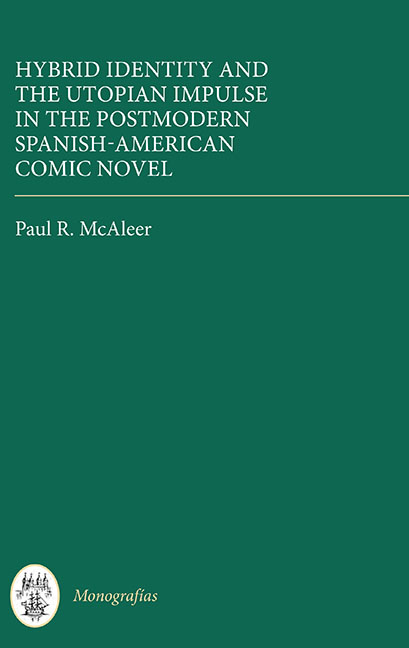Book contents
- Frontmatter
- Contents
- Acknowledgements
- 1 Contextualising the Debate: The European Comic Tradition and the Question of Context
- 2 Gustavo Sainz’s La princesa del Palacio de Hierro: Comedy and the Female Character in Transnational Mexico
- 3 Comic Identity and Cultural Exile in Bryce Echenique’s La vida exagerada de Martín Romaña
- 4 Black Comedy and Identity Loss in Fernando Vallejo’s La virgen de los sicarios: On the Road to Dystopia
- 5 Jaime Bayly’s La noche es virgen: Comic Queer Identities in the Era of Transnationalism
- Utopia, Comedy and Latin American Utopianism: Is This Really the End?
- Bibliography
- Index
1 - Contextualising the Debate: The European Comic Tradition and the Question of Context
Published online by Cambridge University Press: 07 May 2022
- Frontmatter
- Contents
- Acknowledgements
- 1 Contextualising the Debate: The European Comic Tradition and the Question of Context
- 2 Gustavo Sainz’s La princesa del Palacio de Hierro: Comedy and the Female Character in Transnational Mexico
- 3 Comic Identity and Cultural Exile in Bryce Echenique’s La vida exagerada de Martín Romaña
- 4 Black Comedy and Identity Loss in Fernando Vallejo’s La virgen de los sicarios: On the Road to Dystopia
- 5 Jaime Bayly’s La noche es virgen: Comic Queer Identities in the Era of Transnationalism
- Utopia, Comedy and Latin American Utopianism: Is This Really the End?
- Bibliography
- Index
Summary
Comic writing has long been an important feature of the Spanish-American literary tradition. It first appeared in the lampooning genre of journalistic editorials of the nineteenth century, which developed into the short satirical portraits and novels of the costumbrismo tradition. In the twentieth century the modernist and boom writers took up the comic mantle with a veritable explosion of humorous modes. Miguel Ángel Asturias, Enrique Araya, Genaro Prieto, Macedonio Fernández, Leopoldo Marechal, Jorge Luis Borges, Gabriel García Márquez, Ernesto Sábato, Mario Vargas Llosa, Alejo Carpentier, Guillermo Cabrera Infante, Julio Cortázar and José Donoso – nearly all the canonised Spanish-American authors in fact – began to practise a variety of humorous styles in differing degrees. According to Donald Shaw, humour then ‘flourishes afresh’ in the postmodern period, with writers such as Gustavo Sainz, Luis Rafael Sánchez, Alfredo Bryce Echenique, Antonio Skármeta and, later, Alicia Borinsky, Jaime Bayly and Armonía Somers (Shaw, p. 87).
Despite the ubiquity and importance of this trend, however, few critics have paid it much attention, and even fewer have made it the focus of their analysis. The reason for this lack of interest no doubt has something to do with a broad and historic bias against the subject. Hispanic writers and thinkers have, of course, promoted their own prejudices about comedy, which foreign critics have also legitimised. The general argument is that ‘they’ are not naturally inclined towards comedy as a result of an ‘inherited’ tragic mentality, in which, in Spanish- American circles at least, the shadow of Count Keyserling's tristeza criolla can still be detected. Hispanic comedy, according to this way of thinking, is ‘socarrón, satírico, irónico, desenfadado y a la vez amargo, grave, moralista’.
Given the major historical figures of Hispanic literature – Cervantes, Lope de Vega, Tirso de Molina, Quevedo, Mateo Alemán, all masters of different modes of comedy – it remains a surprise that these types of prejudice ever gained ground. Even more surprising is the fact that they still enjoy a silent but palpable cultural currency today, apparent quite clearly in the lack of contemporary studies on the subject.
- Type
- Chapter
- Information
- Publisher: Boydell & BrewerPrint publication year: 2015



